![]()
eurokarate.eu: 2 - Contents of Recognition
|
Support eurokarate.eu with ads and donations! |
20/2/2004 |
The Adventure of the Karate Olympic Recognition
of the Greek Traditional Karate Federation
to the chairman of Hellenic Olympic Committee Mr Lampis Nikolaou
May, 2001 Home Topicality Recognition
The adventure of the Karate Olympic Recognition until May, 2001.
Introduction of the IOC Karate Recognition until May, 2001
In the past fifteen years of IOC President Samaranch's dictatorial rule of the Olympic organization, the members of the ITKF have suffered a series of injustices including one incident in 1985 that has now repeated itself in 1999.
In 1985, IOC President Samaranch promoted the recommendation of the WKF (formerly called WUKO) at the Berlin, Germany IOC General Session. The IOC was influenced by an act of deliberate disinformation, in fact, a criminal act, involving a document, which called for action against another karate organization for its support of apartheid in South Africa. The Association of National Olympic Committees in Africa lodged a complaint, which was switched around to accuse the IAKF/ITKF when in fact the ITKF had been praised for its support of the anti-apartheid movement through its athletes.
These acts have caused tens of millions of dollars in damages to the IAKF.
Note: Then in 1993, WUKO changed its name to WKF, World Karate Federation. Previously, in 1986, the IAKF had changed its name to ITKF.
It is very important to note the 101st IOC Session of 1993 directed that a new unified karate body be formed by the merger of WUKO/WKF and the ITKF, at which point the IOC would consider that organization for Olympic recognition.
On June 19, 1999, IOC President Samaranch pushed for the unilateral recognition of WKF General Karate at the 109th IOC Session held in Seoul, Korea. This act was in direct opposition 'to the directive issued at the 101st IOC Session. Moreover, this act was based on a twisting of the truth as in 1985. In the more recent case, the recommendation for WKF recognition was based on an assertion that the ITKF had not cooperated with unification efforts and deliberately breached unification deadlines, when in fact, well documented, it was WKF itself which blocked efforts for unification.
In addition, the President of WKF, Mr. Delcourt, had been placed under investigation by the French government for various criminal acts including breach of contract and misuse of funds in excess of $2 million.
The enclosed documents clearly demonstrate the ITKF's sincere efforts to bring about successful karate unification as directed by the 101st IOC Session.
As a result of these discriminatory acts by the IOC, Traditional Karate athletes have experienced unjustly deserved treatment and a damaged reputation in the world's sports community.
May, 2001 Home Topicality Recognition
HISTORY BY DOCUMENTATION
The ITKF received notice from the IOC on March 24, 1985 that karate would not be discussed at its forthcoming meeting because two separate karate organizations were in existence. (See Exhibit #1)
Thirty days after the IOC announcement, Mr. Samaranch promoted the unilateral recognition of World Union of Karate-do Organizations (WUKO) based on Mr. Guirandou's Report (at the 1985 IOC 80th Session held in Berlin, Germany). (See Exhibit #2)
This report is full of errors and misrepresentations
1. The Guirandou Report stated that the ITKF had only 6 nationally recognized federations.
FACT: The ITKF had at that moment 73 member countries with 37 of them recognized by their country's sports authorities. (See Exhibit #3) -- An independent report commissioned by the Yugoslavian government confirms this
2. The Guirandou Report stated "WUKO never had relations with apartheid South Africa.”
FACT: WUKO received an official letter of protest from the Association of National Olympic Committees of Africa (ANOCA) for its sports contacts with apartheid South Africa. In fact, ANOCA sent an official report to the IOC regarding this contact. (See Exhibit #4)
3. The Guirandou Report stated: "a member of the IAKF (now the ITKF) had continuous contacts with South Africa."
FACT: The team in question was not a member of the IAKF (ITKF) team but a member of the Amateur Athletic Union (AAU), which is a WUKO member. [See Exhibit #5 (B); (C)]
4. The Guirandou Report stated: “ … I think the IAKF (ITKF) should cease all collaboration with South Africa."
FACT: The IAKF (ITKF) has never collaborated with apartheid South Africa. Moreover, the ANOCA sent a report to the IOC, expressing its appreciation for the IAKF's "support and cooperation against racial prejudice, discrimination and apartheid policies in sport." (See Exhibit #5-a)
Note: (1) "In 1986, the IAKF changed its name to the ITKF.
(2) In 1992, the IOC withdrew WUKO's recognition status.
In September 1993, the 101st IOC session officially announced its decision requiring both Traditional Karate of the ITKF and the General Karate of WUKO to merge into one unified karate body, the World Karate Federation (WKF), in order to gain IOC recognition. (See Exhibit #6)
Note: At the end of 1992, WUKO simply changed its name to WKF without merging with the ITKF. As a result, two "WKF's" exist, the IOC-directed WKF/IOC, and the so-called WKF/ex-WUKO.
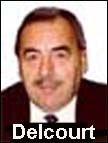 On June 29, 1996, in Osaka, Japan,
WKF/ex-WUKO and the ITKF agreed to form one unified body ("Osaka Statement").
(See Exhibit #7-A)
On June 29, 1996, in Osaka, Japan,
WKF/ex-WUKO and the ITKF agreed to form one unified body ("Osaka Statement").
(See Exhibit #7-A)
At the same time, at the Osaka meeting, both organizations selected representatives for a Joint Working Committee (JWC). (See Exhibit #7-B)
On July 12, 1996, the IOC officially acknowledged the karate union movement as stipulated in the "Osaka Statement". (See Exhibit #7-C)
On October 15, 1996, the JWC drafted the statutes for the Unified Karate Body as determined by IOC Principles (JWC Statutes). (See Exhibit #7-D)
In November 1996, the ITKF officially ratified the JWC Statutes at its General Meeting held in Sao Paulo, Brazil. (See Exhibit #8)
Although the ITKF had officially
ratified the JWC Statutes, Mr. Delcourt, President of WKF/ex-WUKO, concealed
this information and did not bring it up for discussion at the November 1996
meeting held in South Africa. (See Exhibit #8)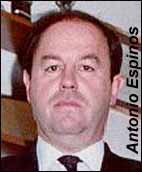
Note: Mr. Delcourt continued to sabotage the JWC Statutes and the Unification Movement. Through the Unification mediator, Mr. Tatsuno, the ITKF proposed holding a meeting for the ITKF and WKF/ex-WUKO representatives to discuss the statutes in an effort to resolve any disagreements. Mr. Tatsuno called for representatives from both organizations to meet in Lausanne, Switzerland on November 21, 1997. In addition, Mr. Tatsuno invited the IOC to send observers. Unfortunately, the IOC observers and the WKF/ex-WUKO representatives completely ignored the JWC Statutes and kept it off the agenda.
The IOC representatives pushed for the formation of a new unification committee, the Karate Unification Committee (KUC). The result was a major step backward for the Unification Movement, all the way back to the Osaka Statement of June 1996.
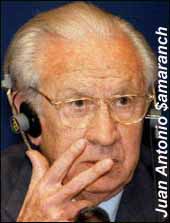 In April 1998, Mr. Delcourt, the
WKF/ex-WUKO president, came under investigation by the French national
prosecutor for forgery, breach of contract and misuse of $2,000,000. As a
result, there was a complete blackout of communication regarding the KUC and the
Unification Movement. (See Exhibit #9)
In April 1998, Mr. Delcourt, the
WKF/ex-WUKO president, came under investigation by the French national
prosecutor for forgery, breach of contract and misuse of $2,000,000. As a
result, there was a complete blackout of communication regarding the KUC and the
Unification Movement. (See Exhibit #9)
Note:
On November 1998, Mr. Delcourt resigned as WKF/ex-WUKO president. Mr. Espinos of
Spain was elected president under the campaign promise that if elected WKF
/ex-WUKO president, IOC President Samaranch would grant the WKF/ex-WUKO official
recognition.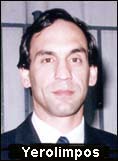
On December 23, 1998, IOC President Samaranch sent notice to WKF/ex-WUKO President Espinos confirming the IOC recognition of the WKF. (See Exhibit #10-1)
An Italian sports magazine "Sportivo" published an editorial strongly attacking Mr. Samaranch's pre-recognition of WKF without an IOC meeting or discussion with its members (See Exhibit # 10-2)
On June 23, 1999, the IOC announced its official recognition of WKF at its 109th Session. (See Exhibit #11)
On June 24, 1999, Mr. Yerolimpos, the General Secretary of WKF/ex-WUKO, announced in an official letter the full recognition of WKF, and thanked IOC President Samaranch for his personal efforts on behalf of WKF/ex-WUKO recognition. (See Exhibit #12)
29/03/1985 Home Topicality Recognition
COMITE INTERNATIONAL OLYMPIQUE
CHATEAU DE VIDY. 1007 LAUSANNE. SUISSE
215 32 71 172/73 24024 CID CIO LAUSANNE
BANQUE UNION DE BANQUES SUISSES, CM. POST. 10-2282
Mr. Hidetaka NISHIYAMA
Executive Director
International Amateur Karate Federation
1930 Wilshire Blvd. Suite 1208
LOS ANGELES / California 90057, United States
Lausanne, 29th March 1985
Ref. no.4066/85
Re : IOC recognition of Karate
Dear Mr. Nishiyama,
As you are aware, a meeting of the IOC Commission for the Programme was held on 25th-26th March 1985 in Lausanne.
May I remind you that the task of the Commission for the Programme with regard to IOC recognition is purely technical: the Commission considers whether an international federation complies with IOC standards and criteria as laid down by the "Olympic Charter".
The Commission for the Programme acknowledges that the sport of Karate complies with IOC criteria and the federations with IOC standards, and therefore maintains its positive recommendation to the recognition of Karate. However, IOC rules stipulate that there can be only one governing body in the world per sport, a strict condition of IOC recognition.
The existence of two international federations, each with different technical rules, is therefore a question beyond the further consideration of the Commission for the Programme, which has decided not to include the recognition of Karate on its agenda until there is only one International Federation governing the sport.
The Commission is of course willing to be of assistance should you require further advice.
Yours sincerely,
Vitaly SMIRNOV
Chairman
Commission for the Programme
September 1993 Home Topicality Recognition
NOTE ON THE PRINCIPLES TO BE INCLUDED IN THE STATUTES
OF THE WORLD KARATE FEDERATION (WKF)
(in French: FEDERATION MONDIALE DU KARATE (F.M.K.)
WITH A VIEW TO ITS RECOGNITION BY THE IOC
.
The present working document, drafted by the IOC, includes the terms of the principles which must be included in the statutes of the WKF to allow the IOC to pronounce the recognition thereof.
The present document is therefore not a set of draft statutes. It is for those responsible to establish for themselves a final draft set of statutes incorporating the principles set out in the present document; once such final draft bas been approved by the WKF itself it will then have to be submitted to the IOC with a view to the definitive recognition of the WKF.
The present working document is being communicated simultaneously to the WUKO and ITKF. These two organizations are invited to come to a decision concerning the present document which forms a whole. In the event of the acceptance of the contents of the present document by one or other party or by both parties, the working group will propose to the IOC Executive Board that it grant provisional recognition to the World Karate Federation (WKF), such recognition becoming final once the final text of the statutes» incorporating the principles let out in the present document, have been
duly approved by the WKF and communicated to the IOC.
In short, what matters and is sufficient for the IOC isthat the principles set out in the present document be incorporated into the statutes of the WKF; the Chairman of the IOC Juridical Commission and the IOC Director General are at the disposal of the parties in order to help them in the final phase or their work if they so wish.
1. Principles concerning the name, vocation, legal status, seat, objects, official and subsidiary languages, certain definitions and the settlement of disputes
1.1. Name:
World Karate Federation (WKF); in French: Federation Mondiale du Karate (F.M.K.).
The WKF is the result of the merger of the WUKO and the ITKF.
Its statutes, although based on those of the WUKO, shall respect the principles set out in the present note which duly takes into account the rules of justice which must prevail in the above-mentioned merger of the two federations.
1.2. Vocation:
To administer on a world scale all forms of karate. The WKF must be apolitical and permit no discrimination.
1.3. Legal status:
Non-profit-making international non-governmental organization of unlimited duration, in the form of an association endowed with a juridical personality.
1.4. Seat:
Paris. Transfer possible upon decision of the Executive Committee of the WKF. (EC).
1.5. Objects:
The mission of the WKF is to train athletes and develop their mental and physical health throughout the world by securing their participation in international karate activities. The WKF seeks to encourage good relations between its member federations and their athletes around the world.
Inter alias, the objects of the WKF are:
1. To promote cordial and friendly relations between its members and to supervise karate activities all over the world;
2. To protect the interests of karate throughout the world;
3. To organize karate throughout the world and to develop and promulgate the techniques and spirit of the karatedo (way of karate) ;
4. To establish the international technical rules of karate;
5. To organize world karate championships in collaboration with the member federations and continental unions. The right to organize world championships and other international meetings shall be granted only to such countries as are able to receive all the participants on their territory;
6. To get karate accepted in the Olympic Games and all other continental Games.
1.6. Official and subsidiary languages:
The official languages of the WKF are French and English.
In the case of divergence between the English and French texts, the French text shall prevail; if the subject of such divergence refers to the sport or technique of karate, reference shall be made to the original Japanese text.
The subsidiary languages are Spanish, German, Arabic and Japanese.
At Congresses, simultaneous translation shall be provided in French, English and Spanish.
1.7. Definitions:
Karate: all sports activities governed by the WKF; within the WKF, those sports activities which were practised under the control of the former ITKF are more specifically designated as "traditional karate".
Country: any state, country, territory or part to territory which the WKF considers, at its total discretion as an area of jurisdiction of a National Federation which it recognizes. The name of a National Federation must correspond to its territorial limits and the tradition of its country, and must be approved by the WKF.
1.8. Disputes:
Any dispute arising from the application or interpretation of the statutes of the WKF to which the parties cannot reach an amicable settlement shall be settled exclusively and finally by a Panel constituted pursuant to the Statutes and Regulations of arbitration of the Court of Arbitration for Sport (CAS). The parties undertake to comply with the provisions of the said Statutes and Regulations and to execute in good faith the award pronounced.
2. Principles relating: to members and affiliations
2.1. Those National Federations (NF) admitted in such capacity may be members of the WKF.
2.2. An NF is an organization, endowed with a juridical personality, which in its country governs all forms of karate, namely forms of karate other than traditional karate as well as traditional karate.
2.3. The admission and exclusion of members of the WKF falls within the jurisdiction of the Congress.
Provisional admission may be decided by the EC, subject to ratification by the Congress.
2.4. In those countries where there is an NF governing all forms of karate the WKF will admit a single NF as a member.
2.5. In those countries where there is no single NF governing all forms of karate, the WKF may recognize a maximum of two NFs, one governing forms of karate other than traditional karate, and the other governing traditional karate.
2.6. Those NFs governing all forms of karate will be designated as "KT Members".
Those NFs governing forms of karate other than traditional karate will be designated as “K Members".
Those NFs governing traditional karate will be designated as "T Members" .
KT members, K members and T members constitute three distinct categories of membership. All the rights and obligations of all KT, K and T members within the WKF are equal, subject solely to the exceptions expressly provided in the statutes of the WKF.
2.7. All members of the WKF are obliged to comply with its statutes.
2.8. The NFs may be members of regional or continental unions or associations of NFs in order to participate in and supervise the organization of regional or continental karate competitions, including in the context of regional or continental games. The WKF may recognize such regional or continental unions or associations, such recognition in no way affecting the right of the WKF to deal directly with each NF and vice versa.
3. Principles relating to World Championships in Karate other international competitions and eligibility
3.1. The WKF is the sole organization in the world qualified to organize world karate championships which are its exclusive property; world karate championships must include traditional karate events.
3.2. The WKF may organize other international karate competitions, including traditional karate.
3.3. The WKF determines the eligibility conditions applicable to the participants in all international karate competitions, including world championships.
4. Principles relating to organization, the organs of the WKF and decisions.
4. 1. The organs of the WKF are:
- The Congress;
- The Executive Committee (EC);
- The President.
Etc. – etc. – etc. -
September 1993 Home Topicality Recognition
29/06/1996
The historic WKF - ITKF Osaka
Declaration!!!

The historic WKF - ITKF Press Conference For Olympics in video!!!
21/11/1997 Home Topicality Recognition
From the international italian magazine "SAMURAI"
Publisher: Giacomo Spartaco Bertoletti
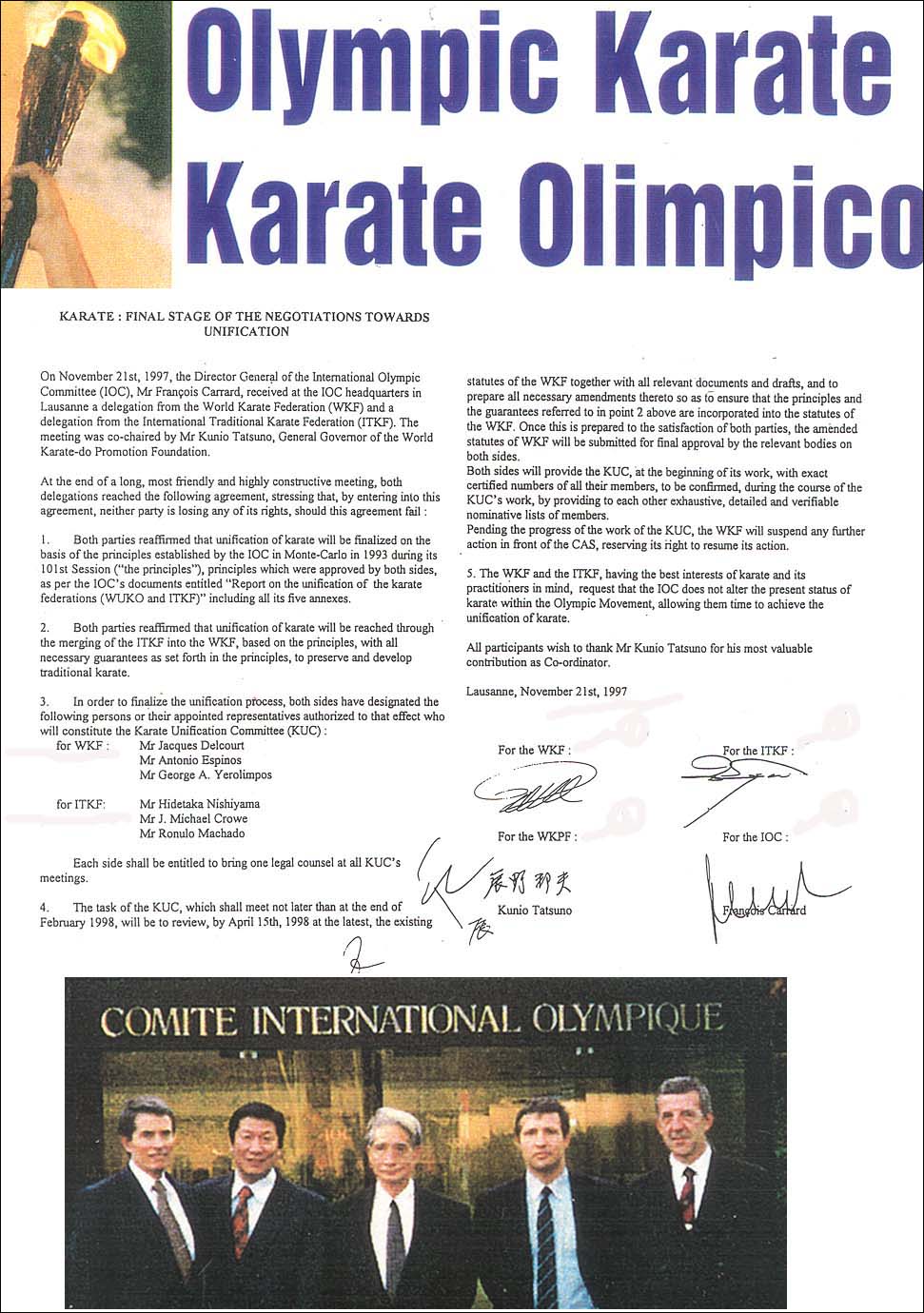
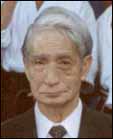 30/03/1999
Home
Topicality Recognition
30/03/1999
Home
Topicality Recognition
INTERNATIONAL TRADITIONAL KARATE FEDERATION
INTERNATIONAL OFFICE 1930 WILSHIRE BLVD SUITE 1208
LOS ANGELES. CALIFORNIA 90067. U.S.A,
PHONE 213/483-8262' CABLE INTAKARATE LOS ANGELES' FAX 213/483-4060
March 30, 1999
To: ITKF Members National Federations
Dear Member,
Recently the World Karate Federation/ex-World Union Karate-do Organization (WKF/ex-WUKO) President Mr. Espinos issued a letter (copy enclosed) stating that his organization has been officially granted International Olympic Committee (lOC) recognition. The International Traditional Karate Federation (ITKF) office has received many inquiries concerning this matter. We address those issues as follows:
1. The ITKF office did not receive the December 23, 1998 letter signed by Mr. Samaranch. This office also notes that no IOC meeting occurred on December 23, 1998.
2. The IOC 101st Session stipulated that the WKF must be a merger of the ITKF and former WUKO and not unilaterally by former WUKO alone. However, the letter by the IOC President should read the WKF (which is the merger organization of WKF/ex-WUKO and ITKF) recognition which shall be discussed at the next IOC General Session.
3. The IOC 101st Session had officially stated that in order for it to recognize an international karate federation that a merger would have to take place between the ITKF and the former WUKO
groups.
The IOC Charter states “The Session is the supreme organ of the IOC … its decisions are final” Therefore, we must trust that the IOC not contribute to the confusion created by Mr. Espinos letter that makes it appear that Mr. Samaranch has violated the IOC own charter by the unilateral recognition of ex-WUKO.
In addition, a rumor has circulated that the WKF/ex-WUKO has won a Court of Arbitration for Sports (CAS) court decision against the ITKF. This information is completely false. First, the CAS has not yet even convened. The WKF/ex-WUKO has challenged the ITKF in the IOC court. However, ITKF legal specialists have determined that WKF/ex-WUKO has no jurisdiction to appeal to the CAS in this matter because no statutes have been reached or agreements made between the ITKF and WKF/ex-WUKO.
The ITKF is now requesting the CAS review the WKF/ex-WUKO's legal jurisdiction in this matter. However, in the event the CAS accepts the WKF/ex-WUKO's jurisdictional claims, then the ITKF will take the opportunity to list in detail the losses and injustices the ITKF has suffered as the result of IOC decisions and management since its recognition of WUKO in 1985.
Sincerely Yours,
Hidetaka Nishiyama
Chairman ITKF
 17/05/1999
Home
Topicality Recognition
17/05/1999
Home
Topicality Recognition
INTERNATIONAL TRADITIONAL KARATE FEDERATION
INTERNATIONAL OFFICE 1930 WILSHIRE BLVD SUITE 1208
LOS ANGELES. CALIFORNIA 90067. U.S.A,
PHONE
213/483-8262' CABLE INTAKARATE LOS ANGELES' FAX 213/483-4060
May 17, 1999
H. E. Juan Antonio Samaranch President
International Olympic Committee
Marques de Samaranch
Chateau de Vidy, 1007 Lausanne Switzerland
Dear Excellency,
On behalf of the International Traditional Karate Federation (ITKF), we express our gratitude for your many years of service to the International Olympic Committee (IOC) and athletes worldwide.
Recently, Mr. Espinosa, President of World Karate Federation/ex- World Union Karate-do Organization (WKF/ex-WUKO), circulated a letter that gave the impression that former WUKO would be recognized by the IOC without a merger with the ITKF. He attached a letter, your Excellencys letter, dated December 23, 1998. (See Exhibit #1)
Very frankly, this information has caused shock among Traditional Karate athletes worldwide and among the general public.
As a result, the ITKF office takes the position bat it must be able to explain the situation regarding lOC recognition to its members in order to prevent any further problems. For this reason, this office has sent a letter of explanation to ITKF members explaining the conditions set at the lOC 1O1st General Session that specifically required the merger by the two federations (ITKF and WUKO) as one unified body for lOC recognition. We are certain that the IOC President himself would never violate the IOC own statutes and rules embodied in its charter. Therefore, we have also explained to our members that they should not be confused by Mr. Espinos’ misleading statements contained in his letter. (See Exhibit #2)
Unfortunately, despite our efforts to explain the matter, a great amount of doubt has been created in the publics trust regarding this matter.
At this very crucial moment in IOC history, the ITKF office is doing its best to avoid any further confusion and trust we can count on your assistance in this matter.
At this time, the ITKF would like to end all past confusions relating to ITKF and lOC relations and to prevent any further confusions. As a result, we make the following proposals:
1. We propose that the IOC grant separate and distinct official recognition to WKF /ex- WUKO as the governing body of General Karate and ITKF as the governing body of Traditional Karate.
This recognition would be based on the distinction Made between the two separate karate disciplines as distinguished by the 1O1st IOC Session decision. (See Exhibit #3)
Furthermore, as a condition, the two separate federations would form one channel of application toward Olympic Sport recognition.
Or.....
2. We propose the IOC cut off all communications relating to Karate until WKF /ex- WUKO and the ITKF merge as one unified body. (Details see Attachment)
The ITKF greatly appreciates your attention to the above propositions in the hope that all concerned will benefit from their implementation.
Very Truly Yours
Hidetaka Nishiyama
Chairman, ITKF
 11/11/99
Home
Topicality Recognition
11/11/99
Home
Topicality Recognition
INTERNATIONAL TRADITIONAL KARATE FEDERATION
INTERNATIONAL OFFICE 1930 WILSHIRE BLVD SUITE 1208
LOS ANGELES. CALIFORNIA 90067. U.S.A,
PHONE
213/483-8262' CABLE INTAKARATE LOS ANGELES' FAX 213/483-4060
November 11, 1999
HE. Juan Antonio Samaranch President
International Olympic Committee Marques de Samaranch
Chateau de Vidy, 1007 Lausanne, Switzerland
Dear Mr. Samaranch:
The ITKF has worked for many years to obtain recognition by the IOC as the international governing body for the sport of traditional karate. For reasons that have never been clear, the executive bureaucracy within the IOC has consistently favoured the organization formally known as "WUKO" (now calling itself "WKF") to the exclusion of ITKF and has left no stone unturned in its effort to confer recognition upon that organization. When provisional recognition was precipitously and unfairly extended to WUKO in 1985, we protested the propriety of that decision. Our efforts were ultimately rewarded once the true facts were made available to the entire IOC, and provisional recognition of WUKO was withdrawn.
On October 10, 1992, the Secretary to the IOC Director General informed us that at its 99th Session in Barcelona the International Olympic Committee made the following determination:
"IOC recognition of the WUKO (now called "WKF") to be withdrawn pending full unification of the sport of karate under a single world body."
The logical underpinning of that determination had to be two facts that are as true today as they were then. First, karate was not "unified", and there were many organizations sponsoring this martial art and sport in its varying forms in international athletics. Second, among those organizations, WUKO (now "WKF") was not pre-eminent and was not deserving of recognition, provisional or otherwise, as the international governing body for all of what was known as "karate".
Since that time it appears that various members of the IOC bureaucracy have worked tirelessly, not to accomplish the unification of karate "under a single world body" or to even define just exactly what the IOC considers to be the sport of karate, but simply to undo the decision of the 99th Session of the IOC. Now, they have accomplished their apparent goal re-recognition of WKF.
The convoluted logic of this apparent seven year campaign to favour WKF is perhaps best revealed in a recent letter from the IOC Director General dated September 9, 1999. First he observed the "very nature of karate" is such that the prospect of unification is "remote at this stage". Karate has a history that extends thousands of years back in time. One must wonder whether unification has become more remote in 1999 than it was in 1992? It seems unlikely.
Having stated that unification is not an attainable goal, he further observed that the IOC can do no more "to assist the parties in solving their own problems". Indeed, this result would seem to be compelled by the IOC's decision in 1992 at its 99th Session to require unification as a first step to recognition. So, we have a martial art form that is not unified and is not likely to be unified, and the IOC can do nothing more to resolve this difficulty - a difficulty that was identified in 1992 as the fundamental obstacle to recognition of WKF or anyone else. Logic would suggest that, having recognized this
truth, it would be premature to recognize any governing body. The very act of doing so would necessarily be inconsistent with the observation that the IOC "cannot do more" to resolve the basic obstacle to recognition: lack of unification within the "various styles and schools" of karate. Yet the substantive differences in styles and schools distinguish the form of sport within karate as much as they distinguish rugby from American football or tennis from badminton.
Nevertheless, the IOC has now re-recognized WKF as the governing body for this undefined and un-unifiable "sport" called karate. Why should the IOC recognize a "sport" that its Director General believes is presently beyond unification because it has so many different styles and schools? We presume, based upon the statement of the Director General, that it is not the role of the IOC to make a value judgement and choose the specific style or school that best defines the "sport" of karate. How then, did the IOC go about making the decision to select one organization from the universe of those available? The explanation offered by the Director General is that WKF "appears to be the best structured and the most apt at playing a useful role within the Olympic Movement (emphasis added)." One must ask, "useful" in what respect? And what is it about WKF that warrants such favourable treatment simply because of a subjective (and unsupported) judgement that it is "best structured" and most "apt" at being useful? Obviously, such a determination ignores the sport and focuses solely upon the organization. Therefore, one must conclude that the governing criteria for recognition of a governing body for whatever sport it claims to represent is its organizational strength and "usefulness" to the Olympic Movement.
Traditional karate is distinguishable from (and we believe it to be superior to) the "style" or "school" of karate practiced by WKF. We believe that ITKF is also best structured and most apt at playing a useful role within the Olympic Movement for the good of our athletes and all athletes who participate in traditional karate, as defined and practiced by ITKF and its member organizations. Accordingly, we respectfully request that the IOC extend recognition to ITKF as the international governing body for traditional karate, which is of course readily distinguishable from the particular style of kicking/punching sport practiced within WKF. We believe our entitlement to such recognition is of at least equal standing with that of WKF.
Thank you for your consideration of this request. If you require additional information beyond that provided to you in our proposal dated May 17, 1999, please advise us. We shall look forward to your response.
Very truly yours
Hidetaka Nishiyama
Chairman
11/11/99 Home Topicality Recognition
ATTACHMENT
To: International Olympic Committee (IOC)
From: International Traditional Karate Federation (ITKF)
PROPOSITION
Since 1976, a period of 23 years, no successful resolution to karate unification has taken place despite the IOC's continued requests and efforts. During that long period, when one side lobbied for unilateral recognition, the other side would counter with its own lobbying efforts. This non-productive pattern repeated itself over and over again. The situation only escalated the controversy and compounded the confusion.
At this time, we wish to take steps to prevent further confusions and make more productive progress.
1. We propose that the IOC grant separate and distinct official recognition to the World Karate Federation/ex-World Union Karate-do Organizations (WKF/ex-WUKO) as the governing body of General Karate and to the International Traditional Karate Federation (ITKF) as the governing body of Traditional Karate. This recognition would be based on the distinction made between the two separate karate disciplines as distinguished by the 101st IOC Session decision. (See Exhibit #3)
Furthermore, as a condition, the two separate federations would form one channel of application toward Olympic sport recognition.
OR...
2. We propose the IOC cut off all communications relating to Karate until WKF /ex- WUKO and ITKF merge as one unified body.
Background Information
A. Obstacles to Unification
(1.) Technical Problems
Both WKF/ex-WUKO and the ITKF claim the name Karate. However, in reality, they are completely separate and distinct disciplines which can not and should not attempt to control the other since each is based on fundamentally different technical structures.
During its period of IOC recognition from 1985 to 1992, WKF/ex- WUKO tried aggressively to control Traditional Karate using the IOC name, but without success. This is clear evidence that one sports/discipline cannot control another sports/ discipline.
The IOC 101st Session clearly stated the distinction between the two disciplines, officially describing Traditional Karate as the discipline practiced by the ITKF. (See Exhibit #2)
Mr. Delcourt, WKF/ex-WUKO's president, one by one, adopted and imitated the names of ITKF's competition categories, and then claimed that WKF/ex-WUKO controlled all forms of karate, including Traditional Karate, merely by adding name changes without any underlying technical understanding.
Not only did WKF/ex-WUKO make such claims, it also strongly pressured Traditional Karate athletes in an effort to bring them under WKF/ex-WUKO’s control. While Delcourt has lost his position with WKF/ex-WUKO, this policy continues unchanged to this day.
It is impossible for one sport/discipline to control all other sports/disciplines. Such an attempt only creates worldwide public confusion and involves the IOC in a large controversy.
(2.) Political Problems
The WKF /ex- WUKO has continually exerted pressure, made propaganda, and misled the public in an effort to convince people that they are the sole governing body of all forms of karate and that the IOC recognize them unilaterally without any merger with the ITKF as directed by the 101st IOC Session. This is an obvious violation of the IOC 101st Session decisions.
In addition, after the 101st IOC Session, in February 1994, Mr. Delcourt, President of WKF/ex-WUKO, made the statement that the IOC recognized WUKO as the WKF. (See Exhibit #4) This false information misled many National Olympic Committees (NOC) and sports ministry authorities resulting in
worldwide confusion and causing problems involving the lOC.
(3) Solutions
The solutions for the problems described above in #1 and #2, in our opinion, would be a complete cut off in IOC dealings with karate until the matter is resolved between the two karate organizations; or separate IOC recognition of each discipline.
The ITKF greatly appreciates the IOC's attention to the above propositions in the hope that all concerned will benefit from their implementation.
Very Truly Yours,
May 17, 1999
Hidetaka Nishiyama
Chairman, ITKF
With Deep Japaneze Bow
www.eurokarate.eu
![]()